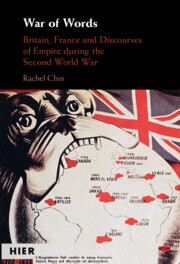Book contents
- War of Words
- War of Words
- Copyright page
- Dedication
- Contents
- Acknowledgements
- Abbreviations
- Introduction
- 1 From the Dunkirk Evacuations to the Franco-German Armistice
- 2 ‘The Real Question at Issue’
- 3 A Necessary Tragedy? The British Bombardments of the French Fleet at Mers El-Kébir
- 4 Vichy, the Free French and the Battle for Imperial Influence at Dakar in September 1940
- 5 Promises of Independence
- 6 Operation Torch
- 7 Independence on French Terms
- 8 Holding On to Empire
- Conclusion
- Bibliography
- Index
6 - Operation Torch
American Influence and the Battle for French North Africa
Published online by Cambridge University Press: 07 July 2022
- War of Words
- War of Words
- Copyright page
- Dedication
- Contents
- Acknowledgements
- Abbreviations
- Introduction
- 1 From the Dunkirk Evacuations to the Franco-German Armistice
- 2 ‘The Real Question at Issue’
- 3 A Necessary Tragedy? The British Bombardments of the French Fleet at Mers El-Kébir
- 4 Vichy, the Free French and the Battle for Imperial Influence at Dakar in September 1940
- 5 Promises of Independence
- 6 Operation Torch
- 7 Independence on French Terms
- 8 Holding On to Empire
- Conclusion
- Bibliography
- Index
Summary
This chapter examines Operation Torch, the 1942 British-American invasion of North Africa and the subsequent Allied decision to work with collaborationist Admiral François Darlan. America’s entrance into the conflict complicated the rhetoric of the Franco-British relationship. Historic imagery focussing on Franco-American collaboration marginalised Britain while American promises to protect the integrity of the French empire recalled Franco-British imperial rivalries. American letters, leaflets, statements and broadcasts conceptualised Torch using heroic and emotional sentiments. They played on historic sensibilities, such as the relationship forged between France and the United States during the Revolutionary War. And they promised to safeguard the French Empire, promises that Britain found offensive in light of their own assurances. After the invasions, the decision to work with Darlan was criticised by the British press and public. For the first time, de Gaulle’s movement enjoyed a significant rise in popularity amongst the British public, articulated through cultural sentiments such as fair play and support for the underdog. Public objections were linked to perceptions of morality. The debates that surrounded Operation Torch and its aftermath highlighted questions of military expediency and moral compromise and the role that the public played in defining acceptable wartime behaviour.
- Type
- Chapter
- Information
- War of WordsBritain, France and Discourses of Empire during the Second World War, pp. 172 - 203Publisher: Cambridge University PressPrint publication year: 2022

